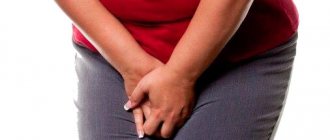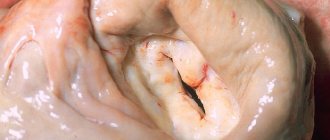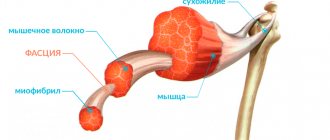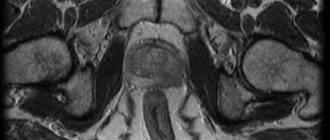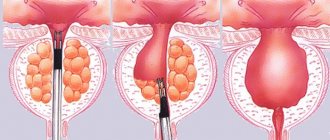February 3, 2021
Incontinence (enuresis) is said to occur when there is uncontrolled, involuntary loss of urine. It is important to consult a doctor with this problem as early as possible. When therapy is started on time, treatment brings good results. Among men with this problem, only 30% go to the doctor. Missed time can aggravate the situation, so it is important to overcome embarrassment and a false sense of shame and contact a specialist. Next, we will tell you in more detail about the causes of incontinence and how to cope with it.
How important is urinary incontinence in men?
The content of the article
Men and women of different ages have different risks of developing urinary incontinence. In childhood, girls complain of urinary incontinence and nocturnal enuresis less often than boys. However, adult women suffer from this problem 2-3 times more often than men due to anatomical differences in the pelvis and changes caused by pregnancy and childbirth.
Over the years, the gender gap has been narrowing. Among people over 65 years of age, 15% of men and 30% of women suffer from urinary incontinence, and at the age of 80 years, both sexes have this pathology in equal proportions.
But people suffering from this disorder, especially men, are usually embarrassed to talk about it and seek medical attention late, so accurate statistics are difficult to obtain.
Are there pills for enuresis?
Urologists are often asked what medications should be taken for nocturnal enuresis in adults. This question can only be answered by knowing exactly the cause of the disease:
- A drug that contains antidiuretic hormone and reduces nighttime urine production may be prescribed.
- For neurotic enuresis, sedatives and mild antidepressants are prescribed.
- There is a method that involves taking combination drugs containing ephedrine. These powerful medications are available by prescription.
But it is not possible to cure enuresis with dietary supplements, since they do not contain real drugs.
Why is urinary incontinence dangerous?
It is clear that constant leakage of urine creates excellent conditions for the proliferation of pathogenic microorganisms. Patients get sick, they are bothered by an unpleasant odor and uncomfortable conditions.
Without timely care, these patients become socially isolated. They are limited in activities and communication and are reluctant to tell family members about their problem. The disease also worsens a man’s psychological state, self-esteem, and reduces self-confidence, i.e. affects the quality of life.
Urologists
Erkov Igor Viktorovich Urologist andrologist
Cost of admission 2500
₽
Make an appointment
Fomenko Alexander Pavlovich Urologist andrologist
Cost of admission 2500
₽
Make an appointment
Anatomy and excretory system of the male urinary organs
The urinary organs remove the end products of decomposition - urea, uric acid and other products formed during the metabolic process in the body.
The urinary system consists of the excretory organs, kidneys and urinary tract, ureters, bladder and urethra.
urinary system
The kidneys are a porous organ located in the abdominal cavity. The right kidney is slightly lower than the left, although their position is not constant. The position of the kidneys depends on age, gender, and body type. Depending on the gender, they can weigh 125 - 170 g, have a length of 11 - 12 cm, a width of 5 - 7.5 cm, and a thickness of 2.5 - 4 cm.
The kidney is surrounded by a fatty capsule that protects and supports it. In the middle of the inner edge of the kidney is the renal cavity, also known as the renal hilum, through which the large renal blood vessels (arteries and veins), nerves, and ureters enter and exit the kidneys.
The kidneys filter all the blood in the body. About 150-180 liters of primary urine are filtered through them per day, and 1.5-2 liters are ultimately excreted.
The structural and functional unit of the kidney is the nephron, which consists of a glomerulus of capillary balls and renal tubules emerging from it. The latter open into the renal calyces. The calyx of the kidneys forms the renal cell, which passes into the urethra. The most important functions of the kidneys are:
General kidney functions
:
- Regulate the amount of water and electrolytes (Na +, K +, Ca2 +, Cl-, etc.) in the body fluid.
- Maintains normal acid-base balance.
- They remove from the body unnecessary and toxic substances of final metabolism, for example, urea, uric acid, phosphates, sulfates, and excrete urine.
Endocrine functions of the kidneys
. Produce and secrete hormones:
- erythropoietin, necessary for the synthesis of hemoglobin;
- angiotensin II, which is important for blood pressure control;
- calcitriol, involved in the metabolism of calcium and phosphorus).
Metabolic functions of the kidneys
. The kidneys are actively involved in the metabolism of proteins, fats and carbohydrates.
The ureter is a paired tubular organ that connects the kidney cell to the bladder. Length 30-35 cm. The urethra descends along the posterior wall of the abdominal cavity and opens at the bottom of the bladder.
The bladder acts as a urinary reservoir. Bladder capacity 350-600 ml. The bladder reflex occurs in the bladder due to the concentration of 200 to 250 ml of urine. When pressure in the bladder increases due to accumulated urine, receptors on the wall of the bladder are stimulated and impulses are transmitted to the urinary center. The stimulation emanating from the center constricts the bladder muscles and relaxes the voluntary external and involuntary internal wrinkles (sphincters), causing urine to be pushed out through the urethra.
In men, the urethra crosses the prostate gland (prostate), the seminal vesicles open into it, and the urethra opens at the head of the penis. Improper functioning of the urinary system can lead not only to urinary incontinence, but also to more serious consequences.
Emotional support
Bladder control problems are common, but many people feel too embarrassed to talk about them. At the very least, talk to your doctor about your bladder problems. Your doctor can help you connect with a support group for people with similar problems.
Talk to your family and friends about your incontinence. Your family and friends can also help you find easier ways to use the bathroom regularly. By sharing your struggles, you may discover that other people in your life also have bladder problems.
Causes of urinary incontinence in men
Urinary incontinence is caused by problems with urine storage and, in some cases, bladder emptying. Sometimes these disorders occur simultaneously.
Urinary incontinence is divided into:
- acute (temporary);
- chronic - stress urinary incontinence, mixed, associated with bladder overflow and functional.
Stress urinary incontinence Stress
urinary incontinence occurs when intra-abdominal pressure exceeds urethral pressure (coughing, sneezing, laughing) and urine leaves the bladder through the urethra. This may be due to anatomical changes in the bladder neck barrier or muscle or nerve damage.
A condition in which the support of the bladder neck is weakened is called increased mobility of the bladder neck (hypermobility). In this case, the goal of treatment is to stabilize the bladder neck and restore the anatomical barrier.
Pathology of the nervous system can cause problems with urination. Nervous disorders can occur in people of any age. Causes:
- Diabetes
. Men who have diabetes for many years may develop nerve damage that affects bladder control. - Stroke, Parkinson's disease and sclerosis
. They affect the brain and nervous system, so they can also cause incontinence or bladder retention.
Urgency urinary incontinence, called irritable bladder with urinary incontinence, is a condition characterized by a sudden urge to urinate, frequent urination, and nocturia. This is the most common type of urinary incontinence in older people. This disorder is often caused by taking diuretics. Urinary incontinence results in drips that occur when the bladder becomes full. This type is the second most common among men.
Functional urinary incontinence, associated with psychological and cognitive impairment, occurs in dementia or after cerebral infarction. However, the neurological mechanisms of urination may remain unchanged.
Mixed urinary incontinence is a condition when it is caused by several mechanisms of the types listed above.
Operative medicine
As for surgical medicine, the following can be applied:
- Injection technique with the introduction of agents to increase volume.
- Use of stem cells.
- The use of sling systems made of synthetic materials - such loops are fixed with titanium screws, attaching them to the pubisciatic branches.
- The use of adjustable sling systems with a regulator in the form of a permanent subcutaneous implant, a self-fixing sling.
- When using the ProACT system, special balloons are placed on the neck of the bladder, and the volume is adjusted using titanium ports placed in the scrotum.
- One of the most commonly used methods is the use of an artificial urinary sphincter, although the insertion operation is expensive and requires the surgeon to have extensive experience in performing such operations. The increased risk of infection should also be taken into account along with the possibility of urethral atrophy, given the prolonged exposure to increased pressure on the organ.
As for the treatment of small patients, surgical intervention is used for congenital disorders - urethroplasty, suturing of bladder fistulas, sphincteroplasty and other operations are involved. If the problem occurs against the background of inflammatory pathologies, conservative therapy for pyelonephritis, urethritis or cystitis is prescribed. In cases where mental disorders contribute to incontinence, it is necessary to visit child psychologists and psychiatrists, and in case of insufficient functionality of the nervous system, nootropic drugs are used.
It is equally important to exclude stressful situations from the child’s life, limit the consumption of various drinks before going to bed, and use forced wake-up at night with putting him on the potty. The most effective physiotherapeutic methods include diathermy, magnetic therapy, darsonvalization, electrophoresis, electrical stimulation of the bladder and others.
Benign prostatic hyperplasia in men causes urinary incontinence
Benign prostatic hyperplasia often leads to lower urinary tract symptoms. One of them - bladder obstruction - is often a companion to an overactive bladder.
The EPIC population-based study, which interviewed patients with prostatic hyperplasia, found that 61.3% of men over 18 years of age experienced symptoms of urinary incontinence. According to the survey, irritation symptoms predominated (49.7%), especially nocturia (urinating 1 or more times per night), and these symptoms bother patients more than obstructive ones.
In patients with benign prostatic hyperplasia, incontinence is often treated with muscarinic receptor antagonists. However, this method worries doctors: they fear that the introduction of muscarinic receptor antagonists to reduce bladder overactivity will increase obstructive symptoms and urinary retention.
This may be why men are prescribed 4 times less frequently for irritating ASCs than women, although the frequency of these symptoms does not differ between sexes.
Why you need to treat nocturnal enuresis
There is not a single person who would like to sleep in diapers or wake up in a puddle of urine. A constant smell, wet underwear and judgmental glances from even the closest people are the eternal companions of people with NE.
Patients with nocturnal enuresis cannot live a normal life: travel is excluded for them, and they have to sleep alone. This is oppressive, an inferiority complex develops, and the psyche is destroyed.
As for health, enuresis is often only a symptom of a disease that requires mandatory treatment, especially when it comes to the kidneys or hormonal imbalance.
Diagnosis of urinary incontinence in men
Men who cannot retain urine rarely dare to talk about it openly, so the doctor’s duty is to purposefully collect complaints, anamnesis, evaluate previous operations, radiation therapy, and so on.
The main symptoms of urinary incontinence:
- uncontrollable urge to urinate;
- frequent urination (> 7 times a day);
- night urination (more than 1 time per night);
- urinary incontinence due to a sudden urge to urinate.
Associated symptoms:
- urinary incontinence during physical activity;
- involuntary urination at night;
- urinary incontinence during sexual intercourse.
When taking a medical history, it is necessary to evaluate the patient's chronic disease and medications, previous treatments, and response to already prescribed treatments.
Any patient complaining of urinary incontinence should have a physical examination.
Necessary examination options:
- Identification of signs of heart failure, often found in patients with nocturia and bedwetting;
- Selective neurological examination - in the presence of symptoms of neurological diseases with urinary incontinence;
- Palpation of the abdominal cavity.
- Rectal examination of the rectum. Tone (at rest, during activity), stool accumulation, tumors, prostate size, surface irregularities, pain are studied.
- Examination of the external genitalia and the condition of the skin. Severe mucosal atrophy, tumors, pain, etc. are detected.
- A cough test can be done for stress urinary incontinence (with a full bladder);
- Urine volume measurement (urine is collected during urination and its volume is measured);
- Urinalysis and urine culture to rule out infections;
- Ultrasound of the bladder.
Urine examination
If there is a risk of urinary retention, a single catheterization of the bladder is performed.
Features of treatment for urinary incontinence in men
Treatment methods are selected depending on the type of urinary incontinence.
Almost always, treatment begins with non-medical measures. It is recommended to eliminate factors contributing to urinary incontinence:
- reduce excess weight;
- strengthen the pelvic floor muscles with special exercises;
- eliminate constipation.
Strengthening the pelvic floor muscles with special exercises
If urinary incontinence persists, electrical stimulation of the bladder is used, biological behavioral therapy - the patient is advised to train the bladder to reduce the intervals between urination, schedule urination, avoid irritating caffeinated drinks, alcoholic and carbonated drinks.
Medications are used in combination with behavioral therapy. The most commonly prescribed anticholinergic drugs are oxybutynin, tolterodine, and others. Drugs in this group block the action of the neurotransmitter acetylcholine, which causes bladder contractions not only in the bladder, but also in muscarinic receptors on the smooth muscles of other organ systems. Unfortunately, these medications can have side effects—some patients suffer from dry mouth, blurred vision, headaches, and constipation.
Tricyclic antidepressants (imipramine hydrochloride) or estrogen preparations with local or systemic hormone replacement therapy are also used to treat urinary incontinence in men.
How common are bladder control problems?
Bladder control problems are common. Almost half of all women experience them at some point in their lives. Women are more likely to develop incontinence during and after pregnancy, childbirth and menopause. These events and the way the female urinary tract is built make incontinence more common in women than in men. However, don't accept incontinence as a routine part of being a woman or aging.
One in three men may accidentally lose urine. A man is more likely to experience incontinence as he gets older, when prostate problems become more common.
What to do until treatment helps?
Urine absorption measures play an important role in the treatment of incontinence, helping to better control the hygienic inconveniences caused by incontinence (dryness, odor control, etc.). When choosing an absorbent device - diapers or men's pads - take into account:
- degree of urinary incontinence;
- amount of liquid;
- need for assistance in changing hygiene products;
- the basic position and activity of the patient.
Patients with urinary incontinence should choose products that best suit their needs. Using the wrong urine absorbent can lead to other problems.
- In cases of mild to moderate urinary incontinence, male pads are recommended. Men often make the mistake of thinking that such urine absorbers are only for women. Men's hygiene products correspond to the male anatomy, therefore they fit well, have a system for neutralizing unpleasant odors, and have different levels of absorption.
- If urinary incontinence is moderate, patients can use special men's protective underwear.
- If urinary incontinence is severe and treatment is impossible, diapers will have to be used. Depending on the need, you can choose from different types, such as anatomical, striped or panties. Modern diapers absorb and retain urine well, reduce the unpleasant smell of urine, are convenient and easy to use, but they are unlikely to suit a man who wants to live a full life. Therefore, this option is a last resort.
Diapers for urinary incontinence
Complications from bladder control problems?
Physical inactivity
Urine leakage can cause a person to slow down or stop physical activity. For example, running, jumping or brisk walking can impair control if someone suffers from urinary incontinence. Or perhaps a woman feels that disposable pads or panties are uncomfortable to move in, so activity may be less fun.
Staying active is important for a person's overall health and can prevent further problems with bladder control. Urinary incontinence can get worse for those who are not physically active. Lack of physical activity can lead to weight gain. People who are overweight or obese are more likely to have bladder problems. Being active can lead to improved bladder health.
Tell your doctor if your bladder control problems are preventing you from being active.
Emotional distress
Unresolved bladder problems can lead to upsetting lifestyle changes. A person may avoid activities that he or she once enjoyed. People may stop going to the movies, meetings, or church because they don't want to use the restroom in the middle of an event or end up in an awkward situation. These changes can lead to depression.
Intimacy issues
Problems with bladder control sometimes cause people to avoid intimacy because they are worried about wetting themselves during sex. Talk to a healthcare professional if bladder control problems are interfering with your sex life. Gynecologists and urologists regularly talk to people about health problems that interfere with sex. A healthy sex life is part of a healthy life.

